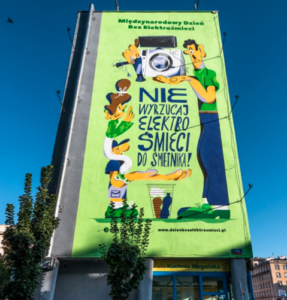 24/11/2021
24/11/2021The fourth annual International E-Waste Day, held on 14th October, was the most high profile yet. The event brought together hundreds of e-waste stakeholders across the world to promote the correct treatment of electrical and electronic equipment to enable reuse, refurbishment and recycling.
The WEEE Forum, an international association of e-waste collection schemes, reported that 172 organisations from 78 countries across 6 different continents registered as participants, with many more entities marking the day with activities, news reports and online campaigns. Collectively, these organisations made the reach of #ewasteday far wider than it was in the previous editions combined and, amidst the growing concern over the e-waste volumes and treatment, raised the profile of the issue even further.
To mark the day, the WEEE Forum itself was involved in the production of a report, in partnership with the UN’s International Telecommunications Union. The thought paper explores the current applicability and scope of digital technologies in enabling the transition to a circular electronics value chain. Together with United Nations University’s SCYCLE programme, the WEEE Forum also produced a vox pop video compilation giving voice to consumers worldwide on the motivations and obstacles they face while it comes to e-waste proper disposal. This highlighted the theme of this year’s International E-Waste Day which focused on the role of consumers in making Circular Economy a reality for e-products.
Elsewhere, the Basel Rotterdam and Stockholm Conventions, UNEP, UNIDO, UNITAR and other United Nations’ entities supported the day by organising webinars or dedicated campaigns. The WEEE Forum members, who act as leaders of International E-Waste Day activities in the countries they cover, secured large national media coverage by hosting conferences, e-waste collections, as well as TV and radio appearances and high-level promotion on social media. The international press coverage, including articles by the BBC, The Independent, La Repubblica, Der Spiegel, Australian ABC News and other influential media news outlets worldwide, and resulted in an estimated reach of over 2.3 billion people. A short overview of all the activities can be found here and below.
Pascal Leroy, Director General of the WEEE Forum, expressed his satisfaction with the outcome of the day, “To have such a widespread involvement in e-waste day and to highlight the issue throughout the world was a fantastic result for us. Not only has it shown to us that the e-waste issue is becoming globally more prominent, it has enabled us to open dialogues with many organisations and understand more about the obstacles faced by those tackling the e-waste challenge. The important thing now is for all e-waste stakeholders to take this success forward and maintain the momentum that we have created.”
Nikhil Seth, UN Assistant Secretary General and Executive Director for UNITAR, in his dedicated message for the occasion, explained that “many UN organisations are joining forces through development of an e-waste collation, harmonizing and synergising their individual efforts towards SDG 12. The UN organisations are increasingly cooperating with governments, companies, NGOs, and academia to address this growing challenges.” He concluded “this 14 October 2021, on International E-Waste Day, let us analyse what progress needs to be made with respect to e-waste management while not forgetting the success stories that can help to show us the way forward. The joint efforts around International E-Waste Day are an important step to manage this wave which threatens to engulf our little planet.”
Commenting on the importance of #ewasteday 2021, the European Commissioner for Environment, Oceans and Fisheries, Virginijus Sinkevičius, said “e-waste is one of the fastest growing waste streams, in Europe and around the world. To change this trend, we should not think of it as waste, but rather wasted opportunity, as longer-lasting products would be massive savings not just for consumers, but in precious raw materials and CO2 emissions.” He added: “at the Commission, we are working on new eco-design requirements for electronic devices, to increase durability and make them easier to repair. And we also want consumers to have better information, so it’s easier to make a sustainable choice.”
About
The WEEE Forum a.i.s.b.l. is an international association representing 51 producer responsibility organisations across the globe. Together with our members, we are at the forefront of turning the extended producer responsibility principle into an effective electronic waste management policy approach through our combined knowledge of the technical, business and operational aspects of collection, logistics, de-pollution, processing, preparing for reuse and reporting of e-waste. Our mission is to be the world’s foremost e-waste competence centre excelling in the implementation of the circularity principle.
Transparency Register ID 702397445-73.
Copyright 2019 All Rights Reserved
Contact
BluePoint conference and
business centre
Boulevard Auguste Reyerslaan 80
B-1030 Brussels
Belgium
Newsletter
Subscribe to our mailing list to get the updates to your email inbox.